不定代词讲解(初中英语语法)
- 格式:pdf
- 大小:15.48 KB
- 文档页数:4

初中语法不定代词的运用技巧不定代词是指在句子中代替名词的词语,它们的特点是不具体指代某个确定的人或物。
在英语学习中,初中阶段是学习不定代词的关键时期。
掌握不定代词的运用技巧,可以帮助我们在写作和口语表达中更加准确、流利地表达自己的意思。
本文将介绍初中语法中不定代词的常见运用技巧。
一、不定代词的种类及其用法1. some和any不定代词some和any用于肯定句和疑问句中,表示一些或任何一个。
在肯定句中,我们通常使用some来表示某些、一些;而在疑问句和否定句中,则使用any。
例子:- Can you give me some advice on how to improve my English?(你能给我一些建议,帮助我提高英语吗?)- Is there any milk in the fridge?(冰箱里有牛奶吗?)2. something和anything不定代词something和anything分别用于肯定句和疑问句中,表示某事或任何事。
something用于肯定句,而anything用于疑问句和否定句。
例子:- I have something important to tell you.(我有一些重要的事情要告诉你。
)- Did you see anything interesting on your way home?(你在回家的路上看到什么有趣的事情吗?)3. somebody和anybody不定代词somebody和anybody用于肯定句和疑问句中,表示某人或任何人。
somebody用于肯定句,而anybody用于疑问句和否定句。
例子:- Somebody called you while you were out.(你外出时有人给你打电话。
)- Is there anybody in the room?(房间里有人吗?)4. somewhere和anywhere不定代词somewhere和anywhere用于肯定句和疑问句中,表示某个地方或任何地方。
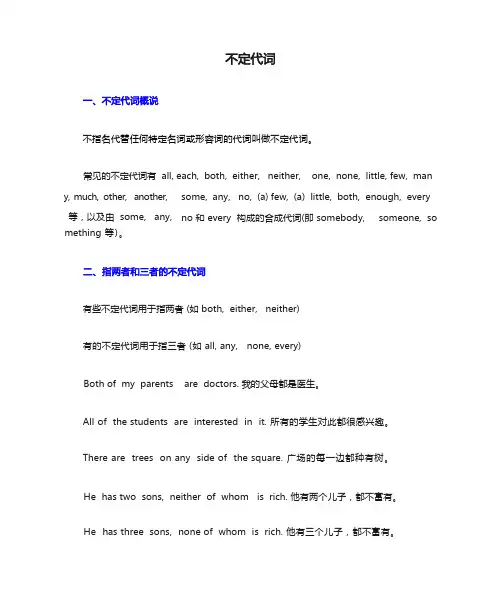
不指名代替任何特定名词或形容词的代词叫做不定代词。
常见的不定代词有 all, each, both, either, neither, one, none, little, few, many, much, other, another,等,以及由 some, any, mething 等)。
some, any, no, (a) few, (a) little, both, enough, every no 和 every 构成的合成代词(即 somebody, someone, so有些不定代词用于指两者 (如 both, either, neither)有的不定代词用于指三者 (如 all, any, none, every)Both of my parents are doctors. 我的父母都是医生。
All of the students are interested in it. 所有的学生对此都很感兴趣。
There are trees on any side of the square. 广场的每一边都种有树。
He has two sons, neither of whom is rich. 他有两个儿子,都不富有。
He has three sons, none of whom is rich. 他有三个儿子,都不富有。
each 可用于两者、三者或三者以上,而 every 只用于三者或三者以上,因此用于两者时只能用 each ,不能用 every 。
如:不能说 There are trees on every side of the road.复合不定代词包括 something, somebody, someone, anything, anybody, any one, nothing, nobody, no one, everything, everybody, everyone 等。
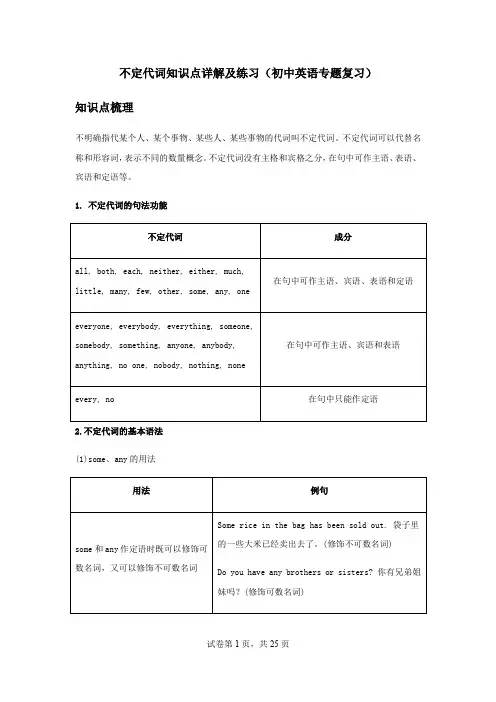
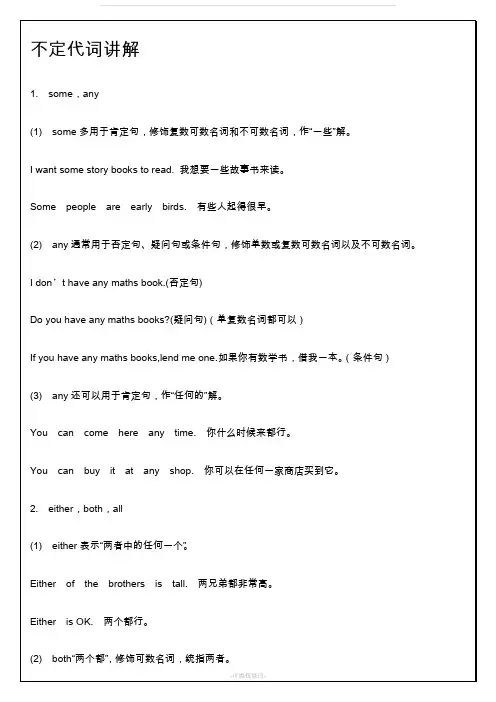
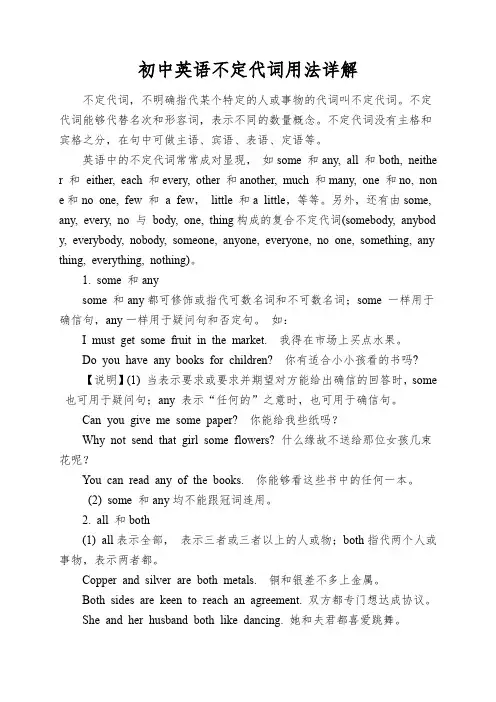
初中英语不定代词用法详解不定代词,不明确指代某个特定的人或事物的代词叫不定代词。
不定代词能够代替名次和形容词,表示不同的数量概念。
不定代词没有主格和宾格之分,在句中可做主语、宾语、表语、定语等。
英语中的不定代词常常成对显现,如some 和any, all 和both, neithe r 和either, each 和every, other 和another, much 和many, one 和no, non e和no one, few 和a few,little 和a little,等等。
另外,还有由some, any, every, no 与body, one, thing构成的复合不定代词(somebody, anybod y, everybody, nobody, someone, anyone, everyone, no one, something, any thing, everything, nothing)。
1. some 和anysome 和any都可修饰或指代可数名词和不可数名词;some 一样用于确信句,any一样用于疑问句和否定句。
如:I must get some fruit in the market. 我得在市场上买点水果。
Do you have any books for children? 你有适合小小孩看的书吗?【说明】(1) 当表示要求或要求并期望对方能给出确信的回答时,some 也可用于疑问句;any 表示“任何的”之意时,也可用于确信句。
Can you give me some paper? 你能给我些纸吗?Why not send that girl some flowers? 什么缘故不送给那位女孩几束花呢?You can read any of the books. 你能够看这些书中的任何一本。
(2) some 和any均不能跟冠词连用。
2. all 和both(1) all表示全部,表示三者或三者以上的人或物;both指代两个人或事物,表示两者都。
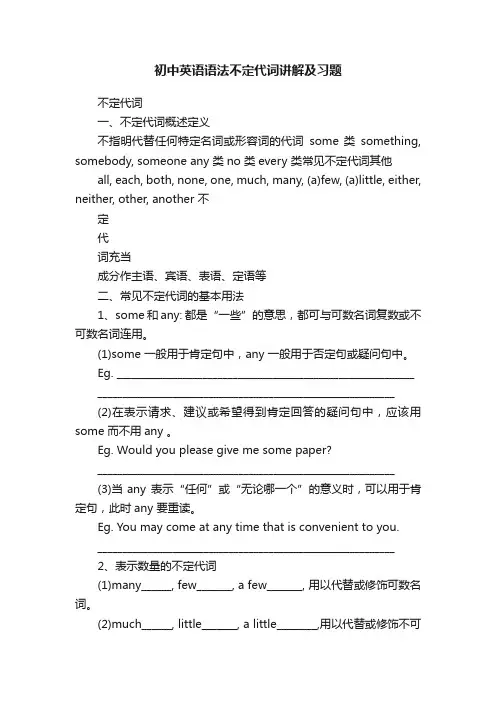
初中英语语法不定代词讲解及习题不定代词一、不定代词概述定义不指明代替任何特定名词或形容词的代词some 类something, somebody, someone any 类no 类every 类常见不定代词其他all, each, both, none, one, much, many, (a)few, (a)little, either, neither, other, another 不定代词充当成分作主语、宾语、表语、定语等二、常见不定代词的基本用法1、some 和any: 都是“一些”的意思,都可与可数名词复数或不可数名词连用。
(1)some 一般用于肯定句中,any 一般用于否定句或疑问句中。
Eg. ___________________________________________________________ ___________________________________________________________(2)在表示请求、建议或希望得到肯定回答的疑问句中,应该用some 而不用any 。
Eg. Would you please give me some paper?___________________________________________________________(3)当any 表示“任何”或“无论哪一个”的意义时,可以用于肯定句,此时any 要重读。
Eg. You may come at any time that is convenient to you.___________________________________________________________2、表示数量的不定代词(1)many______, few_______, a few_______, 用以代替或修饰可数名词。
(2)much______, little_______, a little________,用以代替或修饰不可数名词。
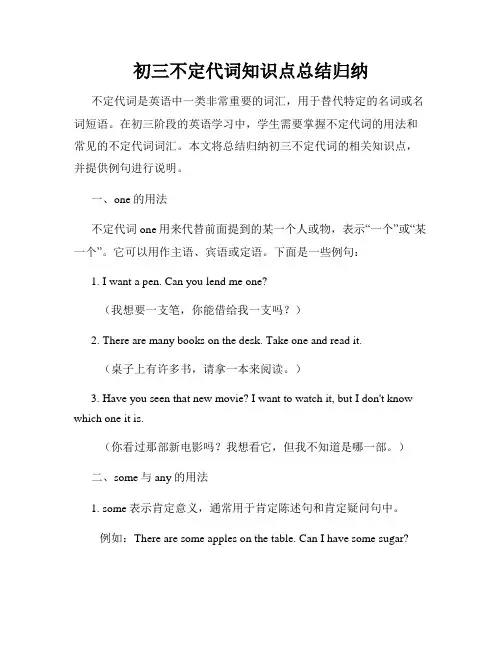
初三不定代词知识点总结归纳不定代词是英语中一类非常重要的词汇,用于替代特定的名词或名词短语。
在初三阶段的英语学习中,学生需要掌握不定代词的用法和常见的不定代词词汇。
本文将总结归纳初三不定代词的相关知识点,并提供例句进行说明。
一、one的用法不定代词one用来代替前面提到的某一个人或物,表示“一个”或“某一个”。
它可以用作主语、宾语或定语。
下面是一些例句:1. I want a pen. Can you lend me one?(我想要一支笔,你能借给我一支吗?)2. There are many books on the desk. Take one and read it.(桌子上有许多书,请拿一本来阅读。
)3. Have you seen that new movie? I want to watch it, but I don't know which one it is.(你看过那部新电影吗?我想看它,但我不知道是哪一部。
)二、some与any的用法1. some表示肯定意义,通常用于肯定陈述句和肯定疑问句中。
例如:There are some apples on the table. Can I have some sugar?2. any表示否定或疑问意义,通常用于否定陈述句和疑问句中,也可以用于条件句中。
例如:I don't have any money. Is there any milk left? If you have any questions, please let me know.三、no、none和neither的用法1. no表示“没有”的意思,通常用于修饰可数名词或不可数名词。
例如:There is no water in the glass. Yesterday, I received no phone calls.2. none表示“没有一个”的意思,可用作代词或形容词,用于修饰可数名词或不可数名词。
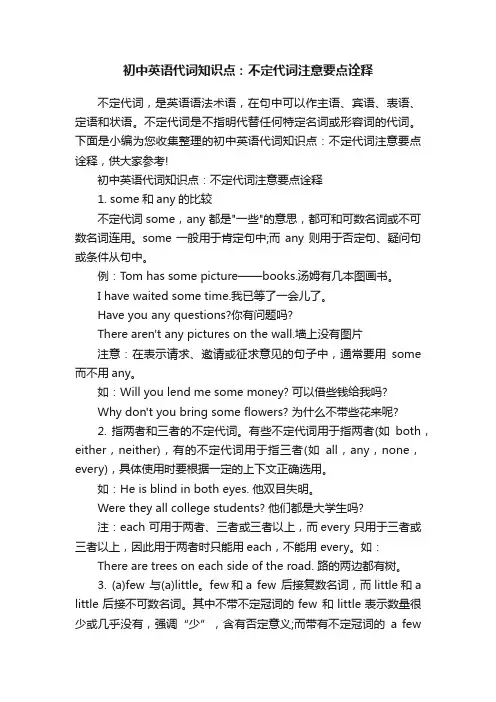
初中英语代词知识点:不定代词注意要点诠释不定代词,是英语语法术语,在句中可以作主语、宾语、表语、定语和状语。
不定代词是不指明代替任何特定名词或形容词的代词。
下面是小编为您收集整理的初中英语代词知识点:不定代词注意要点诠释,供大家参考!初中英语代词知识点:不定代词注意要点诠释1. some和any的比较不定代词some,any都是"一些"的意思,都可和可数名词或不可数名词连用。
some一般用于肯定句中;而any则用于否定句、疑问句或条件从句中。
例:Tom has some picture——books.汤姆有几本图画书。
I have waited some time.我已等了一会儿了。
Have you any questions?你有问题吗?There aren't any pictures on the wall.墙上没有图片注意:在表示请求、邀请或征求意见的句子中,通常要用some 而不用any。
如:Will you lend me some money? 可以借些钱给我吗?Why don't you bring some flowers? 为什么不带些花来呢?2. 指两者和三者的不定代词。
有些不定代词用于指两者(如both,either,neither),有的不定代词用于指三者(如all,any,none,every),具体使用时要根据一定的上下文正确选用。
如:He is blind in both eyes. 他双目失明。
Were they all college students? 他们都是大学生吗?注:each 可用于两者、三者或三者以上,而every 只用于三者或三者以上,因此用于两者时只能用each,不能用 every。
如:There are trees on each side of the road. 路的两边都有树。
3. (a)few 与(a)little。
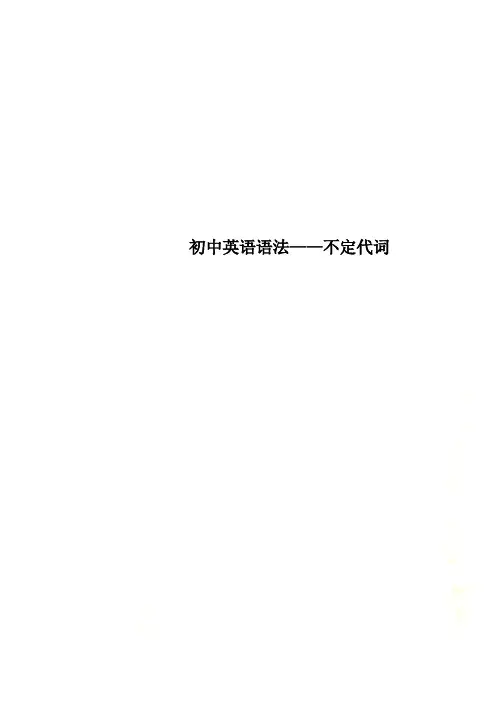
初中英语语法——不定代词初中英语语法——不定代词不明确指代某个人,某个事物,某些人,某些事物的代词叫做不定代词。
不定代词用法比拟复杂,在掌握各个不定代词的用法时有必要把意义相近,用法不同的不定代词进行比拟。
不定代词分为两大类,即普通不定代词和复合不定代词。
不定代词根本用法all some any (1) 用作形容词,其后跟不可数名词和复数可数名词。
(2) 用作代词,可单独使用,也可跟“of+不可数名词和复数可数名词〞。
both (a)few many(1) 用作形容词,其后跟复数可数名词。
(2) 用作代词,其后可跟“of+复数可数名词〞,也可单用。
(a)little much (1) 用作形容词,其后跟复数可数名词。
(2) 用作代词,其后可跟“of+复数可数名词〞,也可单用。
each either neither (1) 用作形容词,其后可跟单数可数名词。
(2) 用作代词,其后可跟“of+复数名词〞,也可单用。
another other 用作形容词,前者与单数可数名词连用,而后者可跟单数可数名词或复数名词,两者都可以与“数字+复数可数名词〞或one连用。
出题点: (1) some和any的用法(2) many和much的用法(3) few, a few, little, a little的用法(4) one, it和that的用法区别(5) other(s)和the other(s)的用法区别(6) none, no one, neither, either的用法区none 只用作代词,代替可数或不可数名词,其后可用“of+ 复数可数名词或不可数名词〞。
everyno只用作形容词,作定语。
复合不定代词这类代词之后通常不跟of短语,但其后可跟形容词作后置定语。
由-body和-one 构成的复合代词之后可跟else,而且可用所有格(-'s)形式。
1.some, any(1) 表示“一些〞时,some和any既可以修饰可数名词,也可以修饰不可数名词。
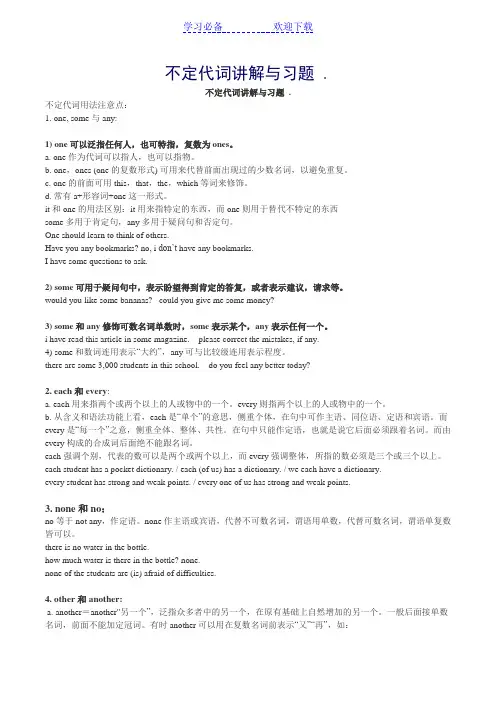
不定代词讲解与习题 .不定代词讲解与习题 .不定代词用法注意点:1. one, some与any:1) one可以泛指任何人,也可特指,复数为ones。
a. one作为代词可以指人,也可以指物。
b. one,ones (one的复数形式) 可用来代替前面出现过的少数名词,以避免重复。
c. one的前面可用this,that,the,which等词来修饰。
d. 常有a+形容词+one这一形式。
it和one的用法区别:it用来指特定的东西,而one则用于替代不特定的东西some多用于肯定句,any多用于疑问句和否定句。
One should learn to think of others.Have you any bookmarks? no, i don’t have any bookmarks.I have some questions to ask.2) some可用于疑问句中,表示盼望得到肯定的答复,或者表示建议,请求等。
would you like some bananas? could you give me some money?3) some 和any修饰可数名词单数时,some表示某个,any表示任何一个。
i have read this article in some magazine. please correct the mistakes, if any.4) some和数词连用表示“大约”,any可与比较级连用表示程度。
there are some 3,000 students in this school. do you feel any better today?2. each和every:a. each用来指两个或两个以上的人或物中的一个。
every则指两个以上的人或物中的一个。
b. 从含义和语法功能上看,each是“单个”的意思,侧重个体,在句中可作主语、同位语、定语和宾语。
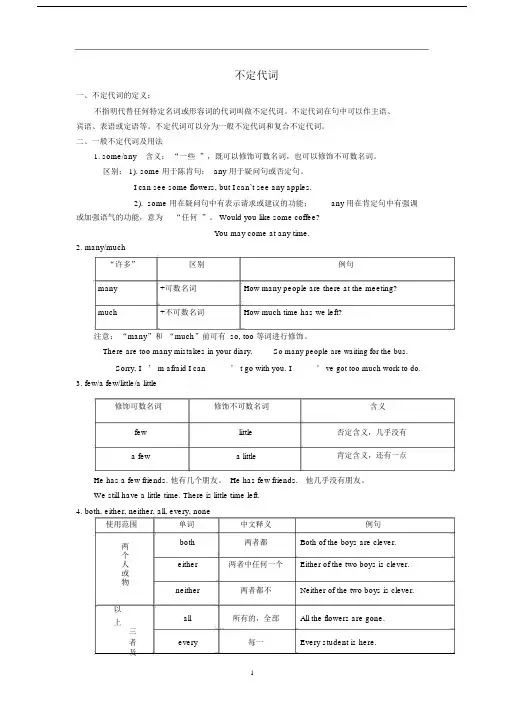
不定代词一、不定代词的定义:不指明代替任何特定名词或形容词的代词叫做不定代词。
不定代词在句中可以作主语、宾语、表语或定语等。
不定代词可以分为一般不定代词和复合不定代词。
二、一般不定代词及用法1.some/any 含义:“一些”,既可以修饰可数名词,也可以修饰不可数名词。
区别: 1). some 用于陈肯句; any 用于疑问句或否定句。
I can see some flowers, but I can`t see any apples.2). some 用在疑问句中有表示请求或建议的功能;any 用在肯定句中有强调或加强语气的功能,意为“任何”。
Would you like some coffee?You may come at any time.2. many/much“许多”区别例句many+可数名词How many people are there at the meeting?much+不可数名词How much time has we left?注意:“many”和“much”前可有 so, too 等词进行修饰。
There are too many mistakes in your diary.So many people are waiting for the bus.Sorry, I ’ m afraid I can ’ t go with you. I ’ ve got too much work to do.3. few/a few/little/a little修饰可数名词修饰不可数名词含义few little 否定含义,几乎没有a few a little 肯定含义,还有一点He has a few friends. 他有几个朋友。
He has few friends. 他几乎没有朋友。
We still have a little time. There is little time left.4. both, either, neither, all, every, none使用范围单词中文释义例句两both 两者都Both of the boys are clever.个人either 两者中任何一个Either of the two boys is clever.或物neither 两者都不Neither of the two boys is clever.以all 所有的,全部All the flowers are gone.上三者every 每一Every student is here.及none都不I like none of the flowers.5.“ other、”“another、”“others和”“the others”易混淆范含other泛指其他的the other(one⋯,the other⋯) = 2 另一个another ≥ 3 另一个others = other+ 名复数剩余非全部其他的the others 剩余全部其他的I have two pencils. One is yellow, the other is red.I don’ t like this green pencil, please give me another one.In our class, some students like playing football, others like playing basketball.There are seven people in Running Man. One is a woman, and the others are men.三、复合不定代及用法1. 复合不定代的构成:复合不定代是由some-,any-,no-,every- 加上 -one,-body ,-thing 所成的不定代。
初中英语语法专题——不定代词1.常见的复合不定代词有:2.不定代词的用法:(1)some 和any 既可代替或修饰可数名词复数,也可代替或修饰不可数名词。
some多用于肯定句,any则多用于否定句,疑问句和条件从句。
any也可以用于肯定句,后接单数可数名词,表示“任何一个……”;后接复数名词,表示“任何的……”(并不强调单个的个体)。
例:You can get it at any shop. 你可以在任何一家商店买到它。
The people will report to you before making any major decisions.这些人在作出任何重大决定前都会向你报告。
但是,在Would you like some tea? 这类问句中则用some,而不用any,这是因为问话者希望得到对方肯定的答复。
(2)many 和much均表示“很多”。
但many 只可代替或修饰可数名词复数,而much只代替或修饰不可数名词。
(3)few 和a few 是一对反义词,代替或修饰可数名词复数;little与a little 也是一对反义词,代替或修饰不可数名词。
few和little 的意思是很少,几乎没有,侧重否定的含义;a few 和a little 的意思是有一些,侧重肯定的含义。
(4)除no one 以外,其他复合不定代词都写成一个词。
(5)不定代词如果有形容词修饰,该形容词置于其后。
例:something interesting 有趣的事情nothing special 没什么特别的(6)由some, any, no , every构成的复合不定代词作主语时,都作单数看待,谓语动词用第三人称单数形式。
例:Someone is waiting for you outside. 某个人正在外面等你。
不定代词㈠some 的用法(1)some 通常指不定数量“一些”修饰代替可数名词复数或不可数名词,即可以指人,又可以指物。
常用在肯定句中。
e.g. He has some Chinese paintings.Some like sports, others like music.(2)some 也可以用在表示“请求,建议,反问”的句子中,期待得到对方的肯定回答。
e.g. Would you like some coffee?Didn’t he give you some books?(3) some 有时可以修饰单数可数名词,表示“某个”e.g. This morning, some boy asked for you.There must be some reason for what he’s done.(4) some 也可以修饰数词,表示“大约”e.g. It took me some twenty days to get there.㈡any 的用法(1)不定代词any和some一样表示不定数量“一些”,修饰和代替可数名词复数和不可数名词,既可指人又可指物。
但一般用在否定句、疑问句,条件从句中。
e.g. Ask me if you have any questions?Do you have any questions to ask?I don't know any of the students.Do you have any questions? If you have any, don' t hesitate to ask me.There isn't any tea left. I'll go and make some for you.(2)用于肯定句中,表示“任何—个”,修饰单数可数名词和不可数名词。
e.g. I don't know any of you.Any child can answer that question.㈢no的用法(1)不定代词no只有形容词性质.—般作定浯来构成否定句,表示“不是”、“没有"’。
不定代词㈠ome 的用法1ome 通常指不定数量“一些”修饰代替可数名词复数或不可数名词,即可以指人,又可以指物。
常用在肯定句中。
He ha ome Chinee e over ome eveningThe tod u both to waitI've met them both before㈥ a的用法1当a做主语时,常代表三个以上的人,谓语动词用复数形式;指事物或情况时。
往往表示“—切”、“所有的”意思,常被看作单数意义,谓语动词用单数形式。
当 a做定语时,既可修饰可数名词,也可修饰不可数名词。
a具有名词和形容词性质,常表示“全体”、“所有的”、“一切”的意思;在句中可用做主语、宾语、表语、定语、同位语或状语。
A are hereA i nownShe ha tod me a about itBi viited a of uThat' aI that a ou can heeA the aericaWe a want to have a trHe i a ecitedShe wa a wet2当a用做主语时,如果后面跟有人称代词。
须在它们之间加上of;如果后面跟的是名词,它们之间可 of,也可不加。
A of them are from BeiingA of the boo are here3当a做同位语时.它在句中的位置随谓语动词而定。
当谓语动词是实义动词时,a放在动词前面;谓语动词是be时.a放在be后面;谓语是由情态动词或助动词加实义动词组成时,a放在它们之间。
The a now the anwerThe are a tudentYou can a go home4 当a 用做人称代词宾语的同位语时,a 放在宾语后面。
如 ou a, them a, u aI’ have to thin about them a again㈦ each 的用法each具有名词和形容词的性质,在句中可用做主语、定语、宾语和同位语。
七年级英语(上)语法(不定代词)1.不定代词的定义和用法不定代词是一类没有具体指向的代词,常用于表示不确定、不具体或泛指的事物或人。
它们代替名词,并在句子中担任主语、宾语、定语等成分。
2.不定代词的种类2.1 一般情况下使用的不定代词有:some:一些any:任何no:没有every:每一个all:所有both:两者皆2.2 表示特指数量的不定代词有:one:一个each:每一个either:两者之一___:两者都不another:另一个___:足够的2.3 表示所有(无法计数)的不定代词有:much:许多many:许多___:少量的few:少量的several:几个a lot of:许多___:很多most:大多数2.4 表示某种程度或种类的不定代词有:more:更多的less:更少的another:另一个other:另一个___:这样的one:一个3.不定代词在句子中的使用不定代词可用于句子的不同位置,具体使用方式如下:作主语:Some students like sports.作宾语:I don't have any money.作定语:Each student has a book.作表语:All is well.作状语:We can go either way.4.不定代词的注意事项在使用不定代词时,需注意以下几个问题:不定代词后面通常不加冠词,例如:I want some water.(不是:I want some a water.)部分不定代词可用于可数名词和不可数名词,但意义可能会有所不同,例如:I ___(具体的几个蛋糕)vs I ate some cake.(一些蛋糕,不确定具体数量)带有否定前缀的不定代词构成否定句时,要注意应将否定词放在不定代词之前,例如:I have no money.(不是:I have money no.)以上是七年级英语(上)语法部分关于不定代词的内容。
不定代词的用法初中不定代词是用来代替不确定的事物或人的词语。
在初中语法学习中,一些常见的不定代词及其用法包括:1.一些(some):用于表示不确定的数量或程度。
例如,There are some books on the table.(桌子上有一些书。
)2.任何(any):用于表示无论哪一个或都可以的意思。
例如,You can choose any fruit you like.(你可以选择任何你喜欢的水果。
)3.没有人(nobody):用于表示没有任何人。
例如,Nobodyknows the answer to this question.(没有人知道这个问题的答案。
)4.所有人(everybody):用于表示所有的人。
例如,Everybody is invited to the party.(所有人都被邀请参加派对。
)5.某人(somebody):用于表示某个人。
例如,Somebodycalled for you when you were out.(你出去时有人打电话给你。
)6.这个(this)/那个(that):用于表示特指的事物或人。
例如,This is my pen.(这是我的钢笔。
)That is her bag.(那是她的包。
)7.大部分(most):用于表示大多数的意思。
例如,Moststudents like playing sports.(大部分学生喜欢运动。
)8.一些人(someone):用于表示某些人,抽象意义上的人。
例如,Someone is waiting for you at the door.(有人在门口等候你。
)通过理解和掌握这些常用的不定代词的用法,可以帮助我们更准确地表达和理解句子的意思,提高语言表达能力。
不定代词知识点八年级不定代词是英语语法中一个比较重要的知识点。
在八年级英语课程中,不定代词被认为是比较难掌握的知识之一。
因此,我们需要对不定代词的相关知识点进行深入地了解和掌握。
一、不定代词的基本概念不定代词是指用来代替某些未被具体确定的人、物、事物的代词。
例如,“someone”、“something”、“somewhere”等。
二、不定代词的分类不定代词可以分成两大类,即不定代词和复合不定代词。
其中,不定代词只有一个词,而复合不定代词由两个或更多的词组成。
1. 不定代词不定代词可以分成以下五类:①肯定不定代词:用来指代肯定的人、事、物,包括“someone”、“something”、“somewhere”、“anyone”、“anything”、“anywhere”等。
例: There must be someone who can help us.②否定不定代词:用来指代否定的人、事、物,包括“nobody”、“nothing”、“nowhere”、“none”、“neither”等。
例: There is nobody in the room.③疑问不定代词:用来表示疑问的人、事、物,包括“who”、“what”、“which”、“where”等。
例: Who is the man in the corner?④“one”不定代词:用来指代特定的事物,也可以用来和数字搭配使用,表示数量。
例: I want to buy one book.⑤“some”不定代词:用来表示肯定的人、事、物,也可以用来表示请求和建议。
例1: Can you give me some water?例2: Why don't you read some books?2. 复合不定代词复合不定代词由两个或更多词组成。
常见的有“anybody else”、“somebody else”、“everybody else”、“something else”等。
不定代词㈠some 的用法(1)some 通常指不定数量“一些”修饰代替可数名词复数或不可数名词,即可以指人,又可以指物。
常用在肯定句中。
e.g. He has some Chinese paintings.Some like sports, others like music.(2)some 也可以用在表示“请求,建议,反问”的句子中,期待得到对方的肯定回答。
e.g. Would you like some coffee?Didn’t he give you some books?(3) some 有时可以修饰单数可数名词,表示“某个”e.g. This morning, some boy asked for you.There must be some reason for what he’s done.(4) some 也可以修饰数词,表示“大约”e.g. It took me some twenty days to get there.㈡any 的用法(1)不定代词any和some一样表示不定数量“一些”,修饰和代替可数名词复数和不可数名词,既可指人又可指物。
但一般用在否定句、疑问句,条件从句中。
e.g. Ask me if you have any questions?Do you have any questions to ask?I don't know any of the students.Do you have any questions? If you have any, don' t hesitate to ask me.There isn't any tea left. I'll go and make some for you.(2)用于肯定句中,表示“任何—个”,修饰单数可数名词和不可数名词。
e.g. I don't know any of you.Any child can answer that question.㈢no的用法(1)不定代词no只有形容词性质.—般作定浯来构成否定句,表示“不是”、“没有"’。
(2)用于警告、命令等。
e.g. No Parking!(3)修饰表语时,有特殊的意思。
试比较:e.g. I am no teacher.I am not a teacher.㈣none的用法none只具有名词性质,可以代替人和事物,表示“三者(以上)都不”,“没有一个人(一件事物)。
做主语时,如果谈到的是所有人的情况,动词多用复数形式;如果谈每个人的状况,则多用单数形式。
它在句中还可充当同位语。
e.g. None of us are / is afraid of difficulties.None of them has a bike.None of the machines is/ are working.We none of us can sing this song.none和neither的区别none表示“在三个或三个以上当中,没有人或物..." 而neither指“在两个当中,没有人或物”。
e.g. None of the students has ever read the book.Neither of my parents has ever read me book.㈤both的用法both 的意思是“两个都”,具有名词和形容词的性质,可做主语、宾语、同位语和定语。
做主语时谓语动词用复数e.g. Both would like to have a try.Both are very honest.We asked both to put forward their suggestions.These two pictures are very beautiful. I like both.Give us some bread. We both want to try a bit.They both skate well.You can take both of them.Both men were interested in the job.a.both后常跟of短语,of+名词,代词(复数),接复数名词时of常省略,接复数代词时of则不省略。
Both(of)the films were very good.Both of them are good teachers.b.both在句中还用做同位语,其位置取决于谓语动词的形式。
①做主语同位语时,如谓语为实义动词(包括用做实义动词的have),both位于主语之后、谓语动词之前。
We both had a haircut.我俩都理了发。
(2)如谓语部分为系动词,both则位于系动词之后和表语之前。
The children were both too young.(3)如谓语是含有助动词或情态动词的短语,both则位于助动词或情态动词之后。
My parents have both been invited.You must both come over some evening.They told us both to wait.I've met them both before.㈥all的用法(1)当all做主语时,常代表三个以上的人,谓语动词用复数形式;指事物或情况时。
往往表示“—切”、“所有的”意思,常被看作单数意义,谓语动词用单数形式。
当all做定语时,既可修饰可数名词,也可修饰不可数名词。
all具有名词和形容词性质,常表示“全体”、“所有的”、“一切”的意思;在句中可用做主语、宾语、表语、定语、同位语或状语。
e.g. All are here.All is known.She has told me all about it.Bill visited all of us.That's all.Is that all you can help me?All the apples in that box go bad.They have all gone to America.We all want to have a try.He is all excited.She was all wet.(2)当all用做主语时,如果后面跟有人称代词。
须在它们之间加上of;如果后面跟的是名词,它们之间可of,也可不加。
e.g. All of them are from Beijing.All (of) the books are here.(3)当all做同位语时.它在句中的位置随谓语动词而定。
当谓语动词是实义动词时,all放在动词前面;谓语动词是be时.all放在be后面;谓语是由情态动词或助动词加实义动词组成时,all放在它们之间。
e.g. They all know the answer.They are all students.You can all go home.(4) 当all 用做人称代词宾语的同位语时,all 放在宾语后面。
如you all, them all, us alle.g. I’ll have to think about them all again.㈦each 的用法each具有名词和形容词的性质,在句中可用做主语、定语、宾语和同位语。
指每个人或事物的个别情况,相当于汉语的“各个”e.g. Each of the boys has a bike.There are flowers on each side of the river.Two men came can I gave a book to each.The teacher gave the pupils four textbooks each.We each have a new school bag now.基础训练一、用所给汉语提示填空1. We want _____________(他们) to help us.2. This is ___________(我的) book. That is ________________ (你的).3. This doesn’t look like my dictionary, it must be____________________. (你的)4. ___________(他)often helps ____________(我们) with _____________ (我们的)lessons.5. Is this book__________________(你的)? No, it isn’t mine_________________(我的). It is _____________ (她的).6. I’ll work out the problem __________________(我自己).二、选择括号中的词填空1. _______________________ of them knows Japanese. (both, neither)2. We study Chinese, English, math and ________________________ subjects. (the other, other)3. Don’t hurry , there is ________________time left. (little, a little)4. Is there ___________________wrong with your bike?Yes, there is ________________ wrong with my it. (something , anything)5. I don’t like this one. Please give me ___________________. (another, other)6. We must get __________________ready before setting off. (everything, anything )7. _________________of us is afraid of difficulties. (few, a few)8. Do you mind if I ask you ____________questions? (few, a few)9. there are many trees on ____________sides of the street in Beijing. (all, both)10. Would you like ______________tea or coffee? (some, any)11. Did they spend ____________money on their trip to Hangzhou?12. There’s _________________wrong with you, but I am afraid you are eating too ___________. (anything,nothing, many, much)13. Did ____________ask me when I was out?(somebody, anybody)。